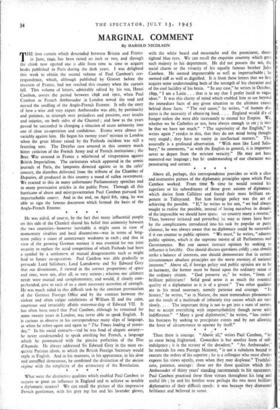He was aided, of course, by the fact that many
influential people on this side of the Channel shared his belief that animosity between the two countries—however inevitable it might seem in view of momentary rivalries and local dissensions--was in terms of long- term policy a cause of unnecessary weakness to each ; and that in view of the growing German menace it was essential for our joint security to replace the acrid competition of which Fashoda had been a symbol by a settlement of mutual disagreements such as might lead to future co-operation. Paul Cambon was able gradually to persuade Lord Salisbury, Lord Lansdowne and Sir Edward Grey that our dissensions, if viewed in the correct proportions of space and time, were not, after all, so very serious ; whereas our ultimate needs were mutual and complementary, and would, if clearly com- prehended, give to each of us a most necessary accretion of strength. He was much aided in this difficult task by the constant provocation of the German Foreign Office and by the contrast between the violent and often vulgar exhibitions of William II and the calm, courteous and invariably affable statesmanship of Edward VII. It has often been noted that Paul Cambon, although he remained for some twenty years in London, was never able to speak, English. It is curious to observe in his correspondence many slips of language, as when he refers again and again to " The Times leading of yester- day." In his social contacts—Ind he was fond of elegant society— he never condescended to speak anything but French, a language which he pronounced with the precise perfection of the Duc d'Aumale. He always addressed Sir Edward Grey in the most ex- quisite Parisian idiom, to which the British Foreign Secretary would reply in English. And in his manners, in his appearance, in his slow and unruffled demeanour, he combined the distinction of the ancien regime with the simplicity of the aristocracy of the Revolution. • * * *


























 Previous page
Previous page